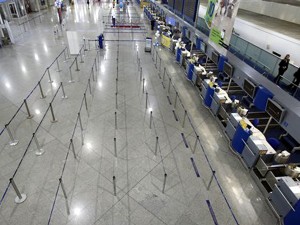Thousands demonstrate in Greece against austerity

Employees walk by empty check-in counters at Eleftherios Venizelos airport during a 24-hour general strike in Athens, Wednesday, Oct. 5 2011. Greek civil servants walked off the job on a 24-hour strike, paralyzing the public sector in a protest over ever-deeper austerity measures applied as the government struggles to avoid a catastrophic default. Air traffic controllers joined the strike, grounding all flights to and from Greek airports. AP Photo
ATHENS—Over 10,000 civil servants and students demonstrated in Athens Wednesday in a public sector strike against deeper austerity cuts that shut down services nationwide.
The protests organized by the two main Greek unions, ADEDY and GSEE, came ahead of a general strike on October 19.
It was called in response to new taxes, wage cuts and layoffs imposed by a government, fighting to avert a default on its debt payments, as the next tranche of an international aid hangs in the balance.
“All workers must unite and coordinate their forces against this storm of measures that strike income and labor rights,” ADEDY chairman Costas Tsikrikas told Flash Radio.
“If we don’t resist we will lose everything,” he said.
Article continues after this advertisementCivil servants are protesting against a plan to put some 30,000 employees on labor reserve and reduced pay after they suffered sweeping wage cuts last year.
Article continues after this advertisement“Labor reserve equals layoffs,” read a banner carried by municipal workers. Communist unions urged Greeks to “organized resistance” as they marched on parliament.
The 24-hour walkout brought trains to a halt and shut down schools and courthouses. Hospitals were placed on emergency staffing.
Museums and archaeological sites were also to remain closed.
The labor plan, accompanied by downsizing at scores of state entities, is designed to ease the state payroll as the government struggles to balance its bulging public deficit.
But there has been mounting criticism even within the ruling Socialist party.
“We have fallen behind in three crucial reform fields – civil service wages, tax evasion and privatizations,” former labor minister Louka Katseli told private television station Mega.
“We gave our (EU) peers an excuse to say that necessary reforms were not carried out in the summer,” she said.
The additional austerity cuts are mandated by Greece’s international creditors – the EU, IMF and European Central Bank – under an economic recovery program launched last year in return for a 110-billion-euro ($149-billion) loan.
Greece’s state reserves to pay wages and pensions run out in November.
A high-level mission from the three organizations, commonly called the ‘troika’ in Greece, is currently conducting an audit of Greek finances.
That will determine whether or not they release an eight-billion-euro loan tranche next month.
The auditors caused widespread shock this week with a demand that the government revise collective labor agreements in the private sector.
“Wages in Greece are low compared to other countries but there are other company costs that are high such as social insurance contributions,” Katseli said.
The country is trapped in a deepening recession and many Greeks point out that the cumulative cuts are only digging a deeper hole for the economy, which is expected to contract by 5.5 percent of output this year.
As the recession has repeatedly neutralized part of the sacrifices, there is concern that additional cutbacks to meet slipping fiscal targets are inevitable.
The Greek finance minister on Tuesday argued that no new austerity measures were needed.
To meet its targets, the government last month announced a new property tax and slashed income tax breaks by over a half.
On Tuesday, global financial markets were in turmoil once again on concerns that Greece might finally default, with investors worried that the banks, especially in Europe, were under increasing pressure from their exposure to Greek government debt.
The Athens stock exchange plunged to an 18-year low after EU officials postponed a bailout of debt-wracked Greece.
Europe delayed the release of loan funds, demanding Athens make more sacrifices and warning banks may have to shoulder more losses as part of the resolution of the debt crisis.